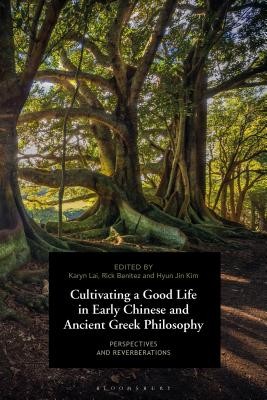
- Išsiųsime per 10–14 d.d.
- Leidėjas: CONTINNUUM 3PL
- Metai: 2018
- Puslapiai: 272
- ISBN-10: 1350049573
- ISBN-13: 9781350049574
- Formatas: 15.6 x 23.4 x 1.6 cm, kieti viršeliai
- Kalba: Anglų
- Extra -15 % nuolaida šiai knygai su kodu: ENG15
Cultivating a Good Life in Early Chinese and Ancient Greek Philosophy + nemokamas atvežimas! | knygos.lt
Atsiliepimai
Aprašymas
This book engages in cross-tradition scholarship, investigating the processes associated with cultivating or nurturing the self in order to live good lives. Both Ancient Chinese and Greek philosophers provide accounts of the life lived well: a Confucian junzi, a Daoist sage and a Greek phronimos.By focusing on the processes rather than the aims of cultivating a good life, an international team of scholars investigate how a person develops and practices a way of life especially in these two traditions. They look at what is involved in developing practical wisdom, exercising reason, cultivating equanimity and fostering reliability. Drawing on the insights of thinkers including Plato, Confucius, Han Fei and Marcus Aurelius, they examine themes of harmony, balance and beauty, highlight the different concerns of scepticism across both traditions, and discuss action as an indispensable method of learning and, indeed, as constitutive of self. The result is a valuable collection opening up new lines of inquiry in ethics, demonstrating the importance of philosophical ideas from across cultural traditions.
EXTRA 15 % nuolaida su kodu: ENG15
Akcija baigiasi už 4d.23:30:52
Nuolaidos kodas galioja perkant nuo 10 €. Nuolaidos nesumuojamos.

- Leidėjas: CONTINNUUM 3PL
- Metai: 2018
- Puslapiai: 272
- ISBN-10: 1350049573
- ISBN-13: 9781350049574
- Formatas: 15.6 x 23.4 x 1.6 cm, kieti viršeliai
- Kalba: Anglų
By focusing on the processes rather than the aims of cultivating a good life, an international team of scholars investigate how a person develops and practices a way of life especially in these two traditions. They look at what is involved in developing practical wisdom, exercising reason, cultivating equanimity and fostering reliability. Drawing on the insights of thinkers including Plato, Confucius, Han Fei and Marcus Aurelius, they examine themes of harmony, balance and beauty, highlight the different concerns of scepticism across both traditions, and discuss action as an indispensable method of learning and, indeed, as constitutive of self. The result is a valuable collection opening up new lines of inquiry in ethics, demonstrating the importance of philosophical ideas from across cultural traditions.




Atsiliepimai